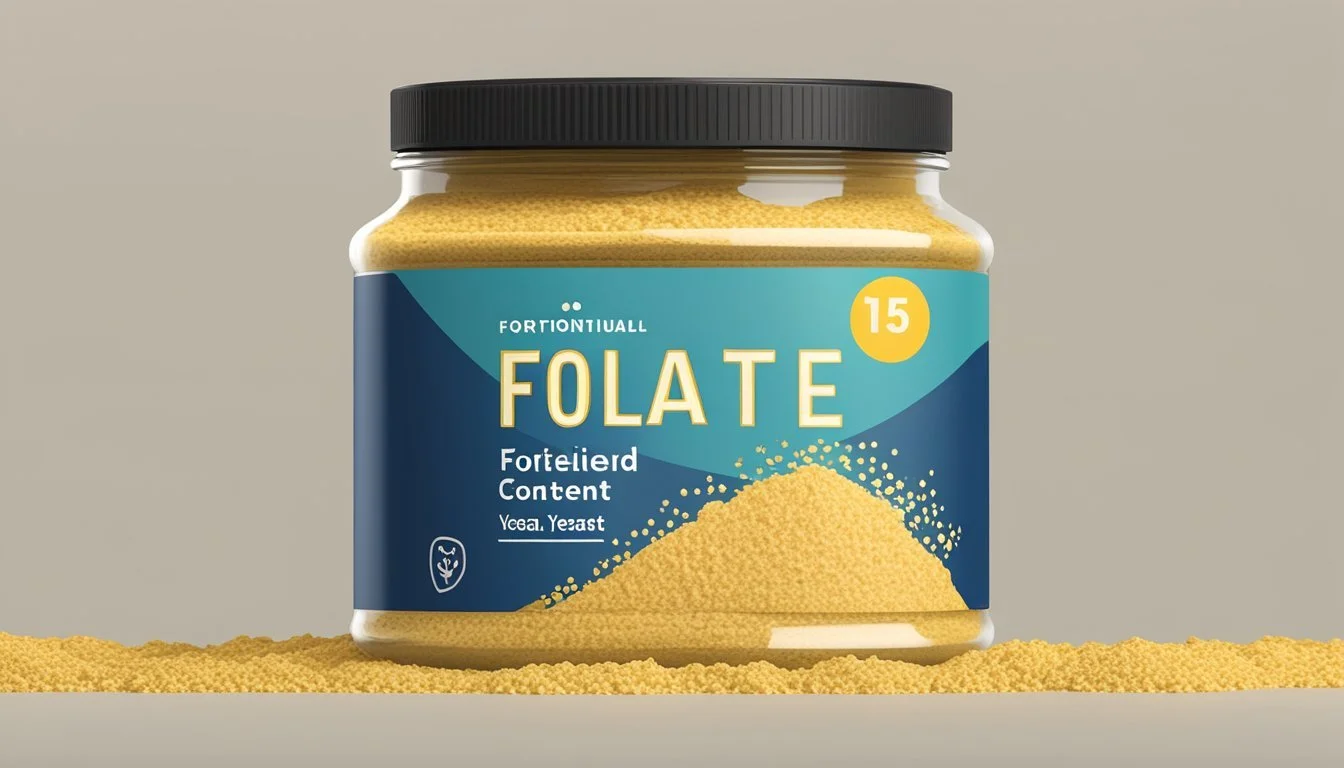Is It Safe to Consume Nutritional Yeast During Pregnancy?
Uncovering the Facts
During pregnancy, women are often advised to pay close attention to their diet, as the right balance of nutrients is crucial for fetal development. Nutritional yeast, a deactivated yeast often found in the form of flakes or powder, is commonly used as a seasoning or supplement, particularly popular among those following vegetarian or vegan diets. It is a rich source of B vitamins, including B12 and folate, which are vital during pregnancy for the prevention of congenital disabilities and to support the developing nervous system of the baby.
The safety of consuming nutritional yeast during pregnancy has been the subject of some debate, largely due to the general caution advised when considering any dietary supplement or additive. However, the scientific consensus suggests that nutritional yeast is considered safe for consumption during pregnancy, provided it is ingested in moderation as part of a balanced and varied diet. Expectant mothers are encouraged to consult with their healthcare provider prior to adding new elements to their diet, including nutritional yeast, to ensure all nutritional choices are made in consideration of their personal health and the well-being of their unborn child.
It is crucial for pregnant women who are vegetarian or vegan to ensure they are getting an adequate amount of B12 and folate, as these nutrients are commonly found in animal products. Nutritional yeast can be a beneficial supplement for those needing to boost their intake of these important vitamins. Because it is fortified with a variety of B vitamins and sometimes iron, nutritional yeast can contribute to meeting the increased nutritional demands of pregnancy. Nevertheless, moderation remains key, and careful inclusion of nutritional yeast into the diet can be a sensible part of managing nutritional needs during this important time.
Nutritional Yeast Overview
In this section, one will find targeted information about what nutritional yeast is, the nutritional benefits it offers, and how it is commonly incorporated into diets.
Defining Nutritional Yeast
Nutritional yeast is a deactivated form of yeast often sold in the form of flakes, granules, or a powder. It is distinct from the yeast used in baking or brewing, as it is inactivated and cannot cause fermentation. Renowned for its cheesy and nutty flavor, nutritional yeast is a versatile seasoning favored in vegan and vegetarian cooking due to its umami profile.
Nutritional Content and Benefits
The nutritional profile of nutritional yeast is impressive, containing a rich array of nutrients including:
Protein: It is a complete protein, offering all nine essential amino acids.
Vitamins: Particularly rich in B vitamins, it is often fortified with vitamin B12, which is important for vegetarians and vegans.
Minerals: Provides minerals like zinc, selenium, magnesium, and iron.
Fiber: Contains beta-glucan fiber known for its potential to aid in lowering cholesterol.
These characteristics make nutritional yeast not only a flavorful addition but also a healthy choice for enhancing nutrition.
Common Dietary Uses
Nutritional yeast is utilized for its savory, cheesy, and nutty flavor, making it a staple ingredient in numerous recipes. Here are some common dietary uses:
Sprinkled over popcorn, salads, or pasta as a flavor enhancer.
As a thickener for soups and sauces, adding richness and depth.
In vegan cheese substitutes due to its cheesy flavor profile.
The versatility of nutritional yeast allows it to fit effortlessly into a large variety of dietary regimes.
Nutritional Yeast in Pregnancy
Pregnancy necessitates heightened nutritional vigilance, and nutritional yeast emerges as a noteworthy supplement due to its rich content of vitamins and minerals vital for a healthy pregnancy.
Importance of Nutrition During Pregnancy
Proper nutrition is essential for expectant mothers to support their health and the development of the baby. A balanced intake of essential nutrients fosters a robust foundation for fetal growth and can mitigate the risk of birth defects. Nutritional yeast is esteemed for its high concentrations of critical vitamins such as B12 and B9, which are pivotal for DNA synthesis and cell division.
Specific Nutritional Needs for Expectant Mothers
Per serving, nutritional yeast offers a substantial amount of folate (1,059 micrograms per tablespoon), surpassing the daily requirement of 400 to 800 micrograms. Folate, or its synthetic counterpart folic acid, is essential to prevent neural tube defects.
Vitamin B12, also copious in nutritional yeast, is a nutrient sometimes deficient in vegetarians and vegans but crucial for preventing developmental irregularities.
Iron: Fortified nutritional yeast can aid in meeting the increased iron needs during pregnancy, preventing anemia.
Zinc: Adequate zinc intake from nutritional yeast supports the immune system and DNA production.
Overall, consuming nutritional yeast during pregnancy can be safe and beneficial, provided it is incorporated in moderation as part of a broader, nutrient-rich diet.
Health and Safety Considerations
When considering the inclusion of nutritional yeast in a pregnancy diet, one must weigh the health benefits against potential risks. The key is to ensure nutritional adequacy while being vigilant about food sensitivities and dietary guidelines.
Balancing Energy and Calories
Nutritional yeast is lauded for its energy-boosting properties, primarily due to its high protein content. Pregnant women often require extra protein; however, it's crucial they consume this in moderation to maintain a healthy caloric balance. A typical serving of nutritional yeast can contain around 5 grams of protein.
Understanding Recommended Dietary Guidelines
Healthcare providers often emphasize the importance of following recommended dietary guidelines during pregnancy. Nutritional yeast can be a beneficial addition, as it is rich in B-vitamins, including folic acid, which is essential for fetal development. However, one should consult with a healthcare provider to align with the specific nutritional requirements of pregnancy.
Assessing Potential Risks and Allergens
While nutritional yeast is generally considered safe, pregnant individuals should assess for allergies and sensitivities. Nutritional yeast could cause adverse reactions in those with yeast sensitivities. Therefore, introducing it slowly and observing for any reactions is advised to ensure both the mother's and baby's safety.
Fortified Nutritional Yeast and Folate
Fortified nutritional yeast is a significant source of folic acid, which is crucial for pregnant individuals to support fetal development. It is often enriched with B12 and other B vitamins.
Role of Folic Acid in Preventing Birth Defects
Folic acid, a synthetic form of folate, is vital in the creation of DNA and the formation of red blood cells. Its significance is especially pronounced during pregnancy, as it is crucial for the development of the fetal nervous system. A sufficient intake of folic acid is linked to a lower risk of neural tube defects, which can lead to conditions such as spina bifida. Fortified nutritional yeast, when included in a balanced diet, can be a beneficial supplement to provide the recommended daily intake of folic acid to pregnant individuals.
Comparison with Other Folate Sources
While fortified nutritional yeast is a valuable source of folic acid, it is important to compare its content with other dietary sources:
Source Folate Content Fortified Nutritional Yeast High Leafy Greens High Legumes Moderate Citrus Fruits Moderate
Unlike folate found naturally in foods like leafy greens and citrus fruits, the folic acid in fortified nutritional yeast is more stable and is added during production to boost its vitamin content. Since not all nutritional yeast is fortified with folic acid, one should check the label to ensure it provides the intended benefits. It's also an alternative for individuals with dietary restrictions, as it can provide nutrients that might be lacking in certain diets, such as vegetarian or vegan diets.
Integrating Nutritional Yeast in Pregnancy Diets
During pregnancy, maintaining a balanced diet is critical, and nutritional yeast can be a safe, nutrient-rich addition. It offers a plethora of benefits, especially in terms of folate content which is vital for fetal development.
Vegan and Vegetarian Considerations
For vegan and vegetarian mothers-to-be, ensuring adequate intake of B vitamins is essential, as these nutrients are often found in animal products. Nutritional yeast is one of the few plant-based sources of complete B vitamins, including vitamin B12, which is crucial to prevent congenital disabilities. It is also rich in protein, providing all nine essential amino acids. When integrating nutritional yeast into vegan or vegetarian diets, expectant mothers can sprinkle it on salads or mix it into soups and pasta dishes, ensuring both flavor and nutritional value without relying on animal products.
Tasty and Healthy Recipe Ideas
Nutritional yeast can be added to a variety of recipes, giving a cheesy flavor without the dairy. Here are two healthy recipe ideas for pregnant women:
Cheese-free Pesto Pasta: Blend nutritional yeast with basil, garlic, nuts, and olive oil for a delicious and healthy pesto sauce, perfect over whole-grain pasta.
Nutrient-packed Popcorn: Popcorn tossed with olive oil and a generous sprinkling of nutritional yeast can serve as a nourishing snack, providing both fiber and a cheesy taste.
Moreover, incorporating nutritional yeast as a topping on baked potatoes or roasted vegetables can enrich meals with an extra layer of nutrients, including iron and zinc.
Alternatives for Dietary Restrictions
For those with dietary restrictions or allergies, nutritional yeast serves as a versatile substitute. It is a soy-free, gluten-free, and dairy-free option, making it a suitable cheese alternative for individuals with lactose intolerance or milk allergies. As not all brands of nutritional yeast are fortified with B vitamins, one should check labels for nutritional content. When dietary choices are limited due to restrictions, nutritional yeast can help achieve a balanced diet by enriching various meals with essential nutrients, while also providing a savory flavor to dishes like salads and pasta.
Consulting Healthcare Providers
During pregnancy, a woman's nutritional needs become particular to her health and her baby's development. Consulting healthcare providers becomes crucial to ensure safety and to address any specific dietary needs or health concerns that may arise.
When to Seek Advice
When introducing nutritional yeast into the diet: Pregnant women should seek advice from their healthcare provider to tailor nutritional integration to their personal health profile. Especially:
Women with dietary restrictions, like vegetarians or vegans, may require specific guidance on vitamin intake.
Those experiencing metabolic changes or concerns with digestion may need an adapted diet plan.
Prior to modifying a diet that could influence pre-existing conditions such as high blood pressure or gestational diabetes.
Addressing Concerns and Complications
For maternal health risks and potential complications:
Diabetes: Nutritional yeast contains carbohydrates that can impact blood sugar levels. Healthcare providers can offer personalized advice for individuals with gestational diabetes.
Blood Pressure: Since the diet directly affects blood pressure, consultation is advised to ensure that dietary changes do not increase the risk of high blood pressure.
Immune System: A healthcare provider can help understand how certain foods, including nutritional yeast, can affect the immune response during pregnancy.
Digestive and Inflammatory Conditions: Regarding concerns such as inflammatory bowel disease and digestion-related issues, healthcare providers can suggest whether nutritional yeast is a suitable additive to the diet.
A thorough consultation is imperative to safeguard both mother and fetus from any adverse effects and to optimally manage conditions like migraines, which can be affected by substances such as tyramine found in various foods.
Frequently Asked Questions
When considering the inclusion of nutritional yeast in their diet during pregnancy, expectant mothers often have questions regarding its safety and nutritional benefits. Nutritional yeast is recognized for its B vitamin content, making it a particularly noteworthy supplement in vegan diets.
Addressing Common Queries
Is nutritional yeast safe during pregnancy? Nutritional yeast is generally safe for pregnant women when consumed as part of a balanced diet. It is a good source of B vitamins that are essential for fetal development.
What are the benefits of nutritional yeast for pregnant women? It contains high levels of vitamin B12 and folate which support the healthy development of the baby's brain and central nervous system. These vitamins are especially important for those following a vegan diet, as they might not obtain sufficient amounts from plant-based foods alone.
Myths and Facts
Myth: Nutritional yeast can replace all dietary needs during pregnancy.
Fact: While nutritional yeast is nutritious, it should complement a balanced diet, not replace it.
Myth: Pregnant women with allergies should avoid nutritional yeast.
Fact: Those with yeast allergies should avoid it, but it's safe for others. Always consult with a healthcare provider prior to making dietary changes.
Nutritional yeast can be fortified with additional nutrients, providing a greater nutritional benefit. Pregnant women should verify if the product is fortified and understand that nutritional needs can differ based on individual health circumstances.
Conclusion
Nutritional yeast, when incorporated into a pregnancy diet, serves as a beneficial supplement providing essential nutrients significant for both mother and baby. Its high content of vitamins B12 and B9, primarily folate, supports healthy fetal development and can help prevent congenital disabilities.
Moderation is key; pregnant women should consider nutritional yeast as a supplement to, rather than a replacement for, a balanced diet. A simple addition of one tablespoon can fulfill, if not exceed, the daily folate requirements for pregnant women.
Choosing a reputable brand is crucial to assure product quality and safety. Women should consult their healthcare provider to confirm that their brand of nutritional yeast is indeed free of harmful substances and appropriate for inclusion in their pregnancy diet.
In conclusion, nutritional yeast is generally considered safe for consumption by pregnant women. Regular intake, in moderate amounts, can prove to be beneficial for a healthy pregnancy. However, it is always advisable to discuss any dietary additions with a healthcare professional to tailor nutrition to individual health needs.







